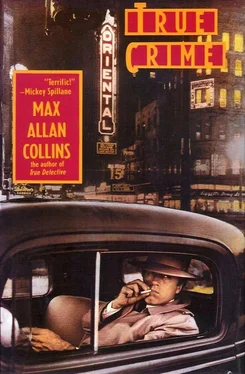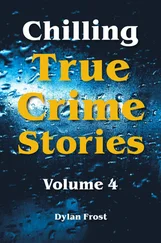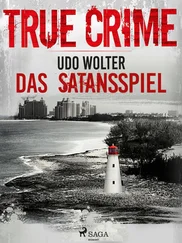Paula smiled as some whiskey went smoothly down, then said, “Maybe I could take a plate up to her.”
Ma was adamant. “She should get right back in the swing of things. Best thing in the world for her.”
I couldn’t help myself. I said, “Ma, don’t you think it’s asking a little much of her to sit down and eat at the table she just saw her boyfriend stretched out dead on?”
That should have killed a few appetites, but everybody’s appetite was alive and well at this table — except for Moran, who was looking at Paula’s glass with glum envy.
Ma didn’t get my point. She said, “It’s just a table.”
Doc Barker, who’d been silently (and dedicatedly) eating, lowered his ear of corn and smiled messily and said, “Ma, sometimes you’re a riot.”
“Don’t sass!”
Across the table from his brother, Fred grinned his mostly gold grin, and said, “You’re a cold-blooded old Ozark gal, Ma, no gettin’ around it!”
“Well,” Ma said, her feelings a little hurt, “there’s apple pie for them that wants it.”
Everybody wanted it except Moran, who sat at the table, slumped. Paula finally took pity on him and went out in the other room to get her pint; she filled a water glass half full for Moran, and freshened her own glass, too.
But he drank it quickly down, and most of us were hardly started on our pie when he stood and announced, “And so to bed.”
Ma said, “So early, Doctor?”
He touched a hand to his chest with mock-drama. “I’ve had a long, tiring and quite difficult day, madam. I lost a patient, in this very room, mere hours ago. There are times when I seek refuge in a bottle; but there are times when sleep can serve that function just as well.”
The two farm boys nudged each other with elbows and laughed. The old doc talked funny.
“Sit down, Doc,” Nelson said, quietly, cutting a small bite of pie with his fork.
“Are you addressing me... Baby Face?”
A pall fell over the room.
Nelson smiled as he forked the bite of pie; lifted fork to lips, ate. “Yes. Sit down.”
“I’m tired. And I will take no orders from—”
“Sit down.”
There’d been no menace in Nelson’s voice.
But Moran thought it best to sit down.
Saying, “Why is my presence required here?”
Nelson said, “Ain’t good manners not to clean up after yourself.”
Moran seemed puzzled, glanced at the area near his plate where he’d been sitting, which was rather tidy actually.
Like a stage magician, Nelson made a sweeping gesture with one hand that summoned to my mind’s eye, and I’d wager to that of anyone else who’d been in this room not long ago, the blue-faced corpse that had been stretched out on this very table.
Finally my appetite deserted me. I pushed the plate of pie away and suddenly the food in my stomach was churning.
“He’s still in the barn,” Nelson said. He looked at Fred. “Right? You haven’t moved him?”
The youngest farm boy whispered to his mother, “Who?” and she shushed him.
Fred said, “He’s out there. Not going anywhere.”
“Well,” Nelson said, rising, wiping his hands with a napkin, “it’s time he did.”
Moran was wide-eyed, indignant, but a little afraid. “This is preposterous.”
Doc Barker rose. “I agree. You botched the operation, Doc. Least you can do is help dispose of the remains. Besides — like you always like to tell us — you know where the bodies are buried. Why should this time be any different?”
Soon five of us were moving through the darkness. Six, counting the sheet-wrapped body of Candy Walker. Doc and Fred Barker carried him, one at either end of him, and he sagged in the middle. Nelson, who knew his way around the farm (I was beginning to gather that he really was related to Verle and Mildred), led the way, with a flashlight in hand. The flashlight was hardly necessary: it was a clear night, stars scattered across the sky like diamonds across a dark tapestry (stolen diamonds, in this company) and part of the moon was up there, working for us, too. The night air was almost cool and the smell of grass and wheat and such was strange and strangely soothing to these city nostrils. I had the shovels over my shoulder, three of them. Moran, muttering to himself, was carrying a heavy bag of quicklime.
We moved past a shocked field, then down into a hollow. We stopped near a clump of trees. Near the trees, but not so near as for the roots to be a problem, we began to dig.
Everybody had a turn, even Nelson, but first up was me and Moran. The body, for the moment, had been rested beneath the nearby trees, out of the way of the dirt.
With everybody having a turn, it didn’t take long, despite being six feet deep. Two people going at it at a time made for a hole larger than need be, but we got the job done. For some reason the physical labor felt good to me. The night had a clarity that made the event seem very real, and yet completely dreamlike.
The two Barker brothers, having hauled the body here and apparently feeling it therefore their province to do so, carried the body of Candy Walker over and rolled it out of the sheet into the hole. They stood looking down in there dumbly, the empty sheet in their hands, like a husk.
Nelson stood there, no tommy gun, but vest open and .45 sticking threateningly up out of his waistband, hands on hips, and ordered Moran: “Get down in there — you’re gonna dump some lye on his hands and face.”
“I will not!”
“Do it,” Nelson said.
Moran, quite sober now, the outburst at the hardware store/saloon well behind him, said, “If you’re considering killing me, keep this in mind: my attorney has an envelope in which much that I know has been recorded. Upon my death, that envelope will—”
“Yeah, yeah,” Nelson said. “Get in there and use the lye. Hands and face. It’ll be the best plastic surgery job you ever did.”
Moran snorted at that, but he climbed down into the hole. Doc Barker handed him down a can of lye, already opened; the strong odor rose up out of the grave like a chemical ghost.
“It’s done,” Moran said hollowly, looking up out of the hole. Wondering if he’d be allowed to emerge.
Nobody said or did anything for the next few seconds, so I reached my hand down to him and pulled him up and out.
Then Nelson said to him, “Now dump some quicklime on him. Half a bag will do. You can do that from up here.”
Moran sighed, irritated but still apprehensive, and took the bag of quicklime from Doc Barker, ripped it open; Freddie stood casually nearby, shovel over his shoulder.
The doctor poured the lime down into the hole, over the body, like he was planting seed; then he set the half-empty bag on the ground near the hole and, standing at one end, looked across the hole where Nelson was and said, “Now what?” and Fred Barker hit him in the back of the head with the shovel.
The sound was something I’ll never forget, yet I can’t describe it. Two sounds, actually, all the result of Fred Barker’s roundhouse swing: metallic at first, almost a clang, echoing across the night; followed by a smack, a sickening smack, like a melon hitting the pavement from a high building. That’s as close as I can come to the sound. But I can hear it to this day.
Dr. Joseph Moran wasn’t hearing anything. He fell facedown into the hole, sprawled on top of dead Candy Walker; the back of Moran’s head was caved in and his brains showed. Doc Barker, without climbing in, poured lye down on the doc’s hands, not bothering with getting in to do his face, then poured the rest of the quicklime over him. And dropped the sheet into the hole; it fluttered in like a wounded bird.
“Come on, come on,” Nelson said to me. “Grab a shovel and start filling in that hole!”
Читать дальше












